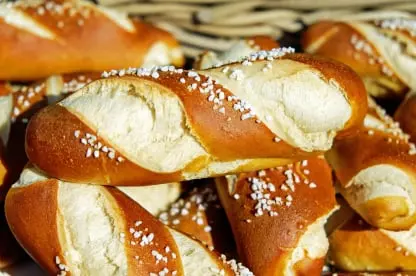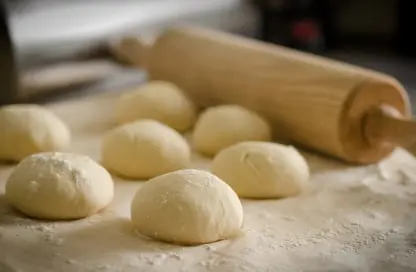Bread quality inspection app:
Bread quality inspection app for bread manufacturer, bakers, bakery, bread retail and wholesale. Full bread quality management solution.

Bread Supplier quality inspection & management
Quality management in the bakery industry is key to making sure your products are produced to the best standard for customer satisfaction. As part of this process, bakeries and other food manufacturers might look at implementing a quality management system (QMS).
This can be a daunting task for many businesses but one that is worth the investment. Having such a system in place will improve product quality and general bakery management.
In this article we look at what a quality management system is and how it might fit into your bakery or food business…
In a food production setting, a quality management system refers to the processes your business has in place to manage the various elements of your production process to ensure your products are made to meet your business standards and the expectations of customers.
A QMS generally consists of business policies, processes, documented information and other resources that might be needed to ensure product quality.
For bakeries, the main task is to produce bread of the best quality. In order to do this, the company must control the batches of incoming raw materials, semi-finished products and finished products. The quality of bread is a set of characteristics that determine the consumer properties of food products and ensure safety for humans. The use of the HACCP system is currently mandatory and is of great importance in the field of food production. JSC “Saratov bakery named after I.K. Struzhkin” is the main supplier of bakery products in Saratov and the Saratov region. In the work, a survey of all stages of the technological process of the production of bakery products of the therapeutic and preventive direction was carried out, quality management systems were analyzed. Control critical points have been identified, a package of documents and a plan for the implementation of the HACCP system at the Saratov Bakery named after I.K. Struzhkin JSC have been prepared.

Bread Quality inspections during production
View App Specifications.
Ensuring Quality Control in Bakery Processing
For bakeries, delivering consistent quality products to retailers and the end consumer is of paramount importance. Quality control in bakery processing has never been more challenging; ensuring the quality of the ingredients themselves and then maintaining that quality throughout processing until product delivery. Foreign body detection, for example, is a major component, to avoid unnecessary recalls and reputational issues. Vice President of Global Quality and Food Safety at the Kellogg Company asks in her article, “Is Zero Foreign Material Possible in Food Processing?” She concludes that it is with the help of in-line detection systems, and here at FPE we knew that already. Read on to find out more.
Overview:
What is quality control in a bakery?
How do you check the quality of a bakery product?
How do you ensure quality control in bakery processing?
Safeguarding quality of bakery products with Eagle
What is quality control in a bakery?
Quality control (QC) in a bakery is the process of ensuring that all food items, from raw ingredients to final baked products, adhere to set standards.
How do you check the quality of a bakery product?
There are a number of quality control parameters that could be relevant to baked goods processors. These include:
Contaminant levels
Protein content and quality
Moisture content and drip loss

Bread Quality control & management
Commercial or high-speed bakeries rely on advanced processing technology and high-quality ingredients to consistently deliver delicious and nutritious baked goods to their customers. Quality control for ingredients and raw materials is an essential part of food safety and quality management systems. These are commonly documented and implemented by industrial food processors and commercial bakeries.
Grain quality is a complex character primarily determined by processes at the crop level. This chapter reviews the effects of environment, genotype, and their interactions, on grain oil and protein concentration and composition. The focus is on sunflower as an oilseed model and bread wheat as a cereal model. Sunflower oil composition is analyzed in terms of concentration and composition of fatty acids, tocopherols and phytosterols while, in bread wheat, grain prolamin composition is considered. Process-based crop models accounting for grain yield in both species, and for concentration and composition of oil (sunflower) and protein (wheat) are described. A combination of modeling and experiments allowed analysis of the relationships between quality traits and yield. Finally, we use physiologically-based relationships of yield and oil attributes (sunflower) and yield and protein attributes (wheat) to design management and breeding strategies for grain quality improvement.
Bread is a staple food in the UK. Consumers buy over 500g of bread each week. The total volume of bread sold in the UK exceeds 2 billion kg.
The stakes for bakeries are high. They must achieve consistent quality control to compete effectively in this marketplace. Bakers must meet the expectations of consumers who want products that look, feel and taste the same each time.
There are traditional methods for quality control of bakery products, relying on sensory evaluation.
However, now, more than ever, technology is providing the means for objective analysis of baking ingredients and products. This type of baking quality analysis is the best way to achieve consistent quality control in a bakery.
Why is Quality Control Important in a Bakery?
Baking involves natural ingredients. Therefore, although bakers can control baking processes, these ingredients can vary considerably.
Successful baking requires repeatable results. This depends on the consistency of ingredients and the consistency of dough production.
If there isn’t consistency at these fundamental stages of baking, then it becomes much harder for bakeries to bake products of a reliable quality time and time again.

Bread factory hygiene checklist
Historically, bakeries have used the senses – touch, sight, hearing, smell and taste – to assess the quality of a baked product. For example, the sight of mould or an “off” smell is a clear sign that microorganism levels are too high. Today, we have more scientific, accurate methods of measuring and therefore controlling the quality of baked goods.
How do you ensure quality control in bakery processing?
Today, quality control in bakery processing is managed with quality control processes and technology. Bakeries apply QA systems such as Hygiene code, HACCP (Hazard Analysis Critical Control Points), and ISO (International Organization for Standardization).
The Hygiene code describes production processes and guidelines to assure food safety and is based on HACCP-principles. HACCP uses a plan of steps to identify, evaluate and control the points in food manufacturing that are critical to food safety). The ISO 9000-series aims to achieve uniformity in products and/or services.
However, it has been noted that most quality assurance systems are too generic; they only describe what level of quality should be reached but not how to arrive at that level. This is where technology comes in.